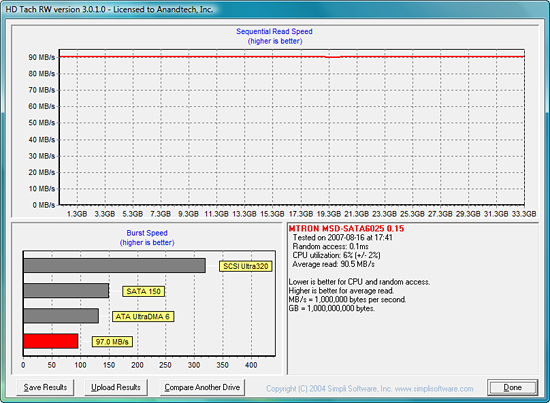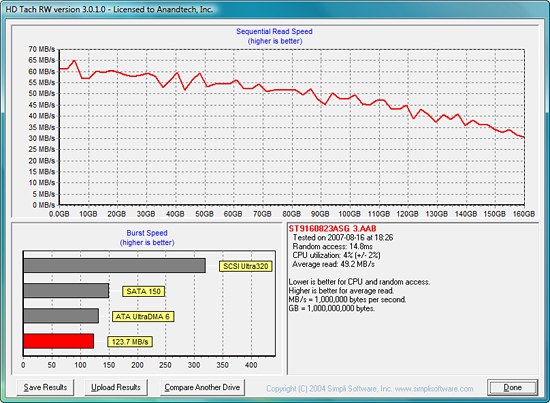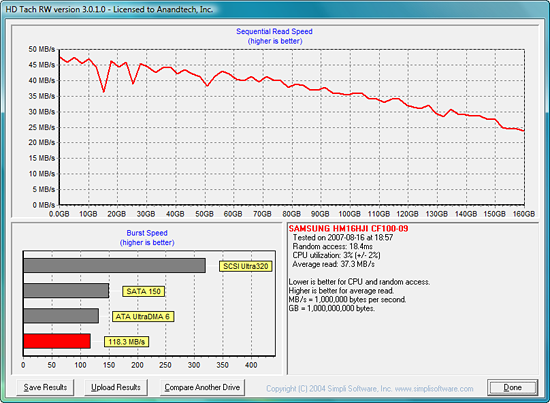HD Tach 3.0 Performance
MTRON 32GB SSD
Seagate Momentus 7200.2 160GB
Samsung MH80 FlashON 160GB
Our first screenshot is the MTRON drive and indicates a sustained transfer rate of 90.5 MB/sec with a burst rate of 97 MB/sec and a outstanding access time of 0.1ms or lower. The same drive on a Intel T7100 (1.8GHz) PM965/ICH8 platform scores a sustained transfer rate of 79.3 MB/sec with a burst rate of 82.5 MB/sec. The Intel controller is up to 14% slower with the MTRON SSD drive in this particular benchmark and follows the same pattern as the Intel desktop chipsets.
Our Seagate drive features sustained transfer rate of 49.2 MB/sec, burst rate of 123.7 MB/sec, and random access speed of 14.8ms. With a slower 5400rpm spindle speed, the Samsung drive provides a sustained transfer rate of 37.3 MB/sec, burst rate of 118.3 MB/sec, and random access speed of 18.4ms. While these numbers are significantly lower than the MTRON SSD, the performance differential in actual application benchmarks will be tempered somewhat by the platform components.
MTRON 32GB SSD
 |
| Click to enlarge |
Seagate Momentus 7200.2 160GB
 |
| Click to enlarge |
Samsung MH80 FlashON 160GB
 |
| Click to enlarge |
Our first screenshot is the MTRON drive and indicates a sustained transfer rate of 90.5 MB/sec with a burst rate of 97 MB/sec and a outstanding access time of 0.1ms or lower. The same drive on a Intel T7100 (1.8GHz) PM965/ICH8 platform scores a sustained transfer rate of 79.3 MB/sec with a burst rate of 82.5 MB/sec. The Intel controller is up to 14% slower with the MTRON SSD drive in this particular benchmark and follows the same pattern as the Intel desktop chipsets.
Our Seagate drive features sustained transfer rate of 49.2 MB/sec, burst rate of 123.7 MB/sec, and random access speed of 14.8ms. With a slower 5400rpm spindle speed, the Samsung drive provides a sustained transfer rate of 37.3 MB/sec, burst rate of 118.3 MB/sec, and random access speed of 18.4ms. While these numbers are significantly lower than the MTRON SSD, the performance differential in actual application benchmarks will be tempered somewhat by the platform components.










25 Comments
View All Comments
kmmatney - Friday, August 17, 2007 - link
I'd like to see these same tests on a drive after a few months of use, and lots of file fragmentation. it looks like all the Hybrid drives really improve is windows standby time - actual application performance seemed a bit porr for the hybrid drive.brundlefly - Sunday, August 19, 2007 - link
File fragmentation is less of an issue on the hybrid then a mechanical.It has no impact on access time, however if you are massively fragmented sequential read time will suffer - but again its much worse on the mechanical.
Again this needs to be drilled in - assuming a hybrid hard drive of the mtron's specs or better, there is no advantage to a mechanical hard drive except price and storage size.
Now that we have the mtron, the performance gap is only going to get bigger, the storage sizes larger, and the prices lower.
puffpio - Friday, August 17, 2007 - link
I'm eagerly looking forward to a full notebook tests (the most important being its effect on battery life)legoman666 - Friday, August 17, 2007 - link
Indeed, so am I. It will be interesting to see how it effects battery life while idle and also when it's doing stuff.Spoelie - Sunday, August 19, 2007 - link
In idle the difference is half a watt.. That's within normal variance of electronic components.Unless you will be using the hard disk very intensively for the entire battery charge (in which the HDD will consume an entire 2 watts more..) you won't notice any difference in battery life.